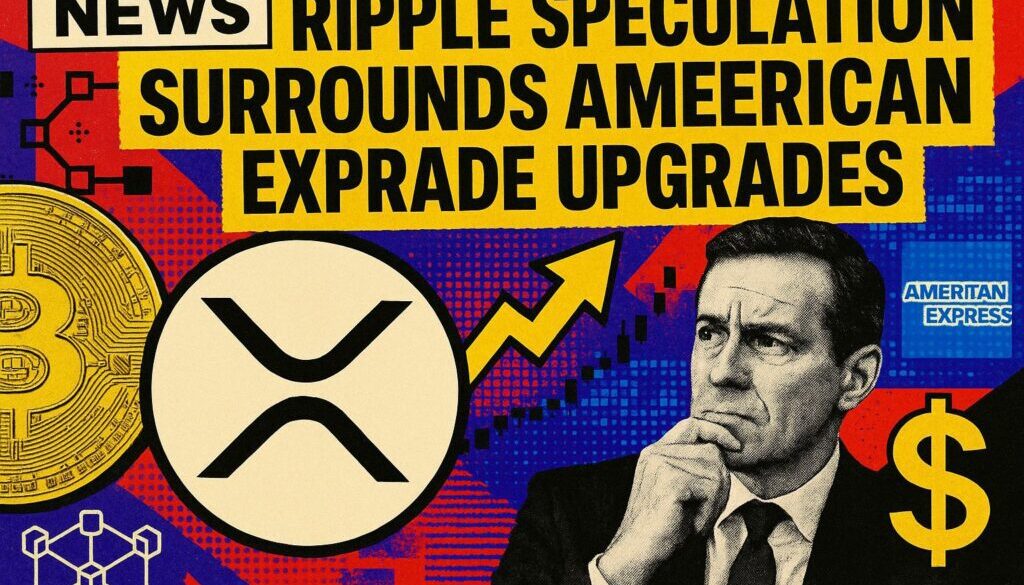Ripple Speculation Surrounds American Express Upgrades

Ripple Speculation Surrounds American Express Upgrades
The world of finance is constantly evolving, and the intersection of traditional institutions with cutting-edge blockchain technology is a hotbed of innovation and, often, speculation. Recently, the crypto community has been buzzing with theories connecting financial giant American Express (Amex) to Ripple’s blockchain technology, particularly following a series of intriguing announcements from Amex.
American Express System Upgrades Spark Curiosity
American Express recently announced significant system upgrades, which led to temporary delays in cross-border payments and wire transfers. The company attributed these disruptions primarily to a "Federal Reserve System update," indicating a move to align its infrastructure with broader changes within the U.S. financial system. While such upgrades are not uncommon for large financial institutions, the timing and the nature of the delays immediately sparked widespread discussion among crypto enthusiasts. The core of this speculation? The potential integration of Ripple’s blockchain technology into Amex’s payment systems.
Despite Amex not explicitly mentioning Ripple in its official statements, the timing has raised eyebrows, especially given their historical relationship. These upgrades also coincide with Amex’s broader efforts to enhance customer experience, adding another layer of intrigue to the situation.
A Look Back: Amex and Ripple’s Shared History
The idea of American Express leveraging Ripple’s technology isn’t new; it’s rooted in a history of past collaborations. Back in 2017, Amex and Ripple publicly partnered to explore the use of blockchain for faster and more transparent international payments. This significant initiative involved American Express FX International Payments (FXIP) and Santander UK, creating a pilot payment channel between the U.S. and the U.K.
The goal was clear: to overcome the common challenges associated with traditional cross-border transactions, such as lengthy delays, high costs, and a lack of transparency. While Amex has not fully adopted blockchain across all its services since then, these early ventures clearly demonstrated an interest in the potential of distributed ledger technology. The current system upgrades have reignited speculation that Amex might be looking to further integrate RippleNet for more efficient and low-cost settlements, building on their foundational work.
The Promise of Ripple’s Technology for Amex
Should American Express indeed integrate Ripple’s technology, specifically RippleNet and its digital asset XRP, it could mark a significant shift in its payment infrastructure. Ripple’s blockchain solutions are designed to facilitate faster, more transparent, and more cost-effective cross-border transactions compared to traditional banking rails.
Here’s how Ripple’s technology could benefit Amex:
- Enhanced Speed: Transactions, especially international ones, could be settled in seconds rather than days.
- Increased Transparency: All parties in a transaction could have real-time visibility into its status.
- Reduced Costs: Lower liquidity costs and fewer intermediary fees could lead to significant savings.
- Wider Global Reach: Streamlined processes could make it easier to expand payment corridors.
- Improved Customer Experience: Faster and more reliable payments directly translate to happier customers.
However, integrating any new, complex technology into an established financial giant like Amex comes with its own set of challenges. These include navigating complex regulatory environments, ensuring seamless compatibility with existing legacy systems, and managing the sheer scale of transactions. Despite these hurdles, the potential for increased efficiency and reduced operational costs makes Ripple’s technology an attractive proposition for a company like Amex, which handles vast volumes of global transactions daily.
Beyond Payments: Amex’s Broader Crypto Play
The current speculation around Ripple and Amex isn’t happening in a vacuum. American Express has shown a broader interest in the digital asset space and enhancing customer experiences through modern solutions.
Consider these recent developments:
- Platinum Card Refresh: Amex recently revealed plans for a significant refresh of its popular Platinum Card, aimed at enhancing the overall customer experience. While not directly blockchain-related, it signifies Amex’s commitment to innovation and catering to evolving customer needs.
- Coinbase One Card Partnership: This announcement coincided with Amex’s partnership with Coinbase to launch the Coinbase One Card. This card offers Bitcoin rewards, directly linking Amex to the cryptocurrency ecosystem and demonstrating a willingness to engage with digital assets as a form of value.
These initiatives collectively paint a picture of an American Express that is actively exploring and embracing various aspects of the digital economy, from loyalty programs to direct crypto rewards. This broader context further fuels the speculation that a deeper integration with a blockchain solution like Ripple’s for its core payment infrastructure might not be far-fetched.
The Future of Finance: Watch This Space
The recent system upgrades at American Express, coupled with their citation of a "Federal Reserve System update" and their historical ties to Ripple, have undeniably ignited a firestorm of speculation within the crypto community. While no official confirmation has been made regarding a direct integration of Ripple’s technology into Amex’s latest upgrades, the convergence of these events, alongside Amex’s other crypto-adjacent initiatives, has certainly piqued interest.
As XRP’s value remains modestly stable amidst these discussions, the financial world and crypto enthusiasts alike are keenly watching for any further announcements. Whether this is merely coincidence or a precursor to a major blockchain adoption remains to be seen, but one thing is clear: the lines between traditional finance and decentralized technology continue to blur, promising exciting developments for the future of payments.


